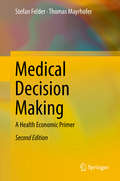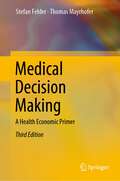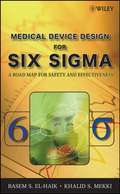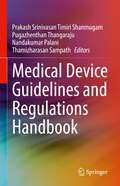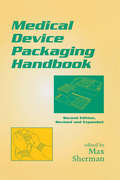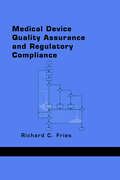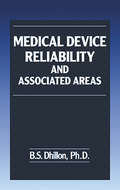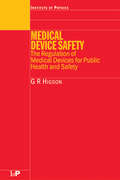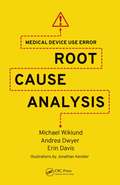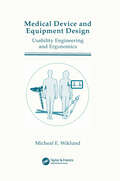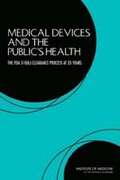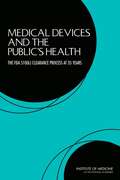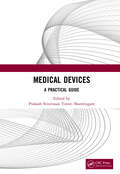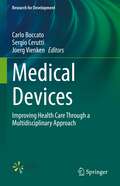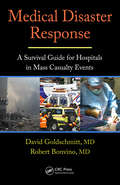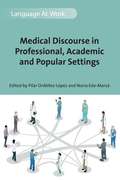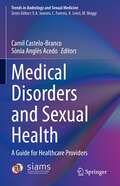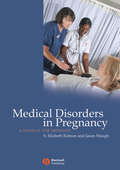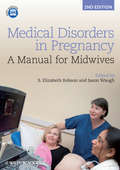- Table View
- List View
Medical Decision Making
by Stefan Felder Thomas MayrhoferThis textbook offers a comprehensive analysis of medical decision making under uncertainty by combining Test Information Theory with Expected Utility Theory. The book shows how the parameters of Bayes' theorem can be combined with a value function of health states to arrive at informed test and treatment decisions. The authors distinguish between risk-neutral, risk-averse and prudent decision makers and demonstrate the effects of risk preferences on physicians' decisions. They analyze individual tests, multiple tests and endogenous tests where the test outcome is chosen by the decision maker. Moreover, the topic is examined in the context of health economics by introducing a trade-off between enjoying health and consuming other goods, so that the extent of treatment and thus the potential improvement in the patient's health becomes endogenous. Finally, non-expected utility models of choice under risk and uncertainty (i. e. ambiguity) are presented. While these models can explain observed test and treatment decisions, they are not suitable for normative analyses aimed at providing guidance on medical decision making.
Medical Decision Making: A Health Economic Primer
by Stefan Felder Thomas MayrhoferThis textbook offers a comprehensive analysis of medical decision-making under uncertainty by combining test information theory with expected utility theory. The authors show how the parameters of Bayes’ theorem can be combined with a value function of health states in order to arrive at informed test and treatment decisions in the face of diagnostic and therapeutic risks. Distinguishing between risk-neutral, risk-averse, and prudent decision-makers, they demonstrate the effects of risk preferences on medical decisions. Furthermore, they analyze individual and multiple tests as well as diagnostic models in which the decision-maker chooses the test outcome. The consequences of test and treatment decisions for the patient are encompassed by quality-adjusted life years (QALYs) and the standard economic model, which applies the willingness to pay for health approach. Lastly, non-expected utility models of choice under risk and uncertainty are presented. Although these models can explain some of the test and treatment decisions observed, they are less suitable for normative analyses aimed at providing guidance on medical decision-making. This third edition provides extensively revised versions of all chapters and reflects recent innovations in medical decision-making such as decision curve analysis. New chapters focus on the health economics of and revealed preferences in medical decisions. The book is intended for students of (health) economics and medicine as well as for medical decision-makers and physicians dealing with uncertainty in their test and treatment decisions.
Medical Device Design for Six Sigma
by Khalid S. Mekki Basem El-HaikThe first comprehensive guide to the integration of Design for Six Sigma principles in the medical devices development cycleMedical Device Design for Six Sigma: A Road Map for Safety and Effectiveness presents the complete body of knowledge for Design for Six Sigma (DFSS), as outlined by American Society for Quality, and details how to integrate appropriate design methodologies up front in the design process. DFSS helps companies shorten lead times, cut development and manufacturing costs, lower total life-cycle cost, and improve the quality of the medical devices. Comprehensive and complete with real-world examples, this guide:Integrates concept and design methods such as Pugh Controlled Convergence approach, QFD methodology, parameter optimization techniques like Design of Experiment (DOE), Taguchi Robust Design method, Failure Mode and Effects Analysis (FMEA), Design for X, Multi-Level Hierarchical Design methodology, and Response Surface methodologyCovers contemporary and emerging design methods, including Axiomatic Design Principles, Theory of Inventive Problem Solving (TRIZ), and Tolerance DesignProvides a detailed, step-by-step implementation process for each DFSS tool includedCovers the structural, organizational, and technical deployment of DFSS within the medical device industryIncludes a DFSS case study describing the development of a new devicePresents a global prospective of medical device regulationsProviding both a road map and a toolbox, this is a hands-on reference for medical device product development practitioners, product/service development engineers and architects, DFSS and Six Sigma trainees and trainers, middle management, engineering team leaders, quality engineers and quality consultants, and graduate students in biomedical engineering.
Medical Device Guidelines and Regulations Handbook
by Prakash Srinivasan Timiri Shanmugam Pugazhenthan Thangaraju Nandakumar Palani Thamizharasan SampathThis comprehensive resource features in-depth discussions of important guidelines and regulations needed to understand and properly meet medical device code-related requirements. Focusing on the practical application of the regulations, the Medical Device Guidelines and Regulations Handbook delivers clear explanations, real-world examples, and annotation on the applicable provisions that will allow you to safely and confidently choose materials and processes for medical device development, testing, and manufacturing. A critical resource for researchers and professionals in the medical device field;Thoroughly covers ISO 10993, ISO 22442, ISO 14971, ISO 13485, ISO 21534, REACH, RoHS, CLP, EU MDR;Presents simplified guidelines and regulation points.
Medical Device Packaging Handbook, Revised and Expanded
by Max ShermanThis volume details current developments in industry practices and standards relating to medical device packaging. This edition offers entirely new as well as revised chapters on packaging materials, package validation and methods and integrity testing, bar-coding technology, environmentally sound packaging and disposal procedures, storage autoclave sytems, international standards, customer needs, regulatory aspects, and more.
Medical Device Quality Assurance and Regulatory Compliance
by Richard C. Fries"Acquaints developers of medical devices with the basic concepts and major issues of medical quality assurance and regulatory documents, describes the requirements listed in these documents, and provides strategies for compliance with these requirements."
Medical Device Reliability and Associated Areas
by B.S. DhillonAlthough Reliability Engineering can trace its roots back to World War II, its application to medical devices is relatively recent, and its treatment in the published literature has been quite limited. With the medical device industry among the fastest growing segments of the US economy, it is vital that the engineering, biomedical, manufacturing,
Medical Device Safety: The Regulation of Medical Devices for Public Health and Safety
by G.R HigsonMedical Device Safety: The Regulation of Medical Devices for Public Health and Safety examines the prospects for achieving global harmonization in medical device regulation and describes a possible future global system. Unresolved difficulties are discussed while solutions are proposed. An essential book for all those involved in health physics, en
Medical Device Use Error: Root Cause Analysis
by Erin Davis Michael Wiklund Andrea DwyerMedical Device Use Error: Root Cause Analysis offers practical guidance on how to methodically discover and explain the root cause of a use error-a mistake-that occurs when someone uses a medical device. Covering medical devices used in the home and those used in clinical environments, the book presents informative case studies about the use errors
Medical Device and Equipment Design: Usability Engineering and Ergonomics
by Michael E. WiklundThe key to profitability and success in both the medical device and the equipment markets often relates to how easy your products are to use. User acceptance and preference frequently is dependent upon ergonomic design.Medical Device and Equipment Design helps you enhance your product design, maximize user acceptance, and minimize potential problems in the marketplace. It provides practical guidance on how to plan and incorporate ergonomic design principles into medical devices and equipment so users intuitively feel comfortable with the product.Design engineers, usability and reliability engineers, software programmers, documentation specialists, product managers, quality engineers, and market/product managers will find this text invaluable in getting usability built into products from the very beginning.
Medical Devices and Biomaterials for the Developing World
by Sujata K. Bhatia Olumurejiwa A. FatundeThis book focuses on the adoption of medical technology in the developing world, and the role that can be played by new biomaterials. These authors urge that advanced technology be aligned with the needs of developing and emerging markets, and an alternative definition of technology be embraced. This "new technology" considers natural sources of materials and tools for treatment and is not restricted to the usual traditional computerized or electronic technology. This book explores the difficulties that accompany successful transfer of technologies between disparate settings. The book then leaves the world of traditional technology and focuses on biomaterials, which represent an enormous opportunity for developing societies to become active participants in the development of new technologies. Biomaterials can be used in the treatment of disease throughout the developing world and beyond. Biomaterials encompass a range of naturally derived substances; of particular interest here are naturally derived and synthetically manufactured materials with potential applications in different body systems. Because many of these materials can be grown, the agricultural output of developing nations is an obvious potential source of these biomaterials. The book considers the cases of Ghana and Nicaragua as examples of the broader situation in West Africa and Central/South America. These two regions are uniquely positioned with regard to both health care and technological capabilities, and both stand to grow significantly in the coming years. While the agricultural sectors of the two nations are quite different, both are major producers of corn and other materials that should be investigated further. Of course, the difficulty in using a foodstuff for medical purposes is fully explored.
Medical Devices and Human Engineering (The Biomedical Engineering Handbook, Fourth Edition)
by Joseph D. Bronzino Donald R. PetersonKnown as the bible of biomedical engineering, The Biomedical Engineering Handbook, Fourth Edition, sets the standard against which all other references of this nature are measured. As such, it has served as a major resource for both skilled professionals and novices to biomedical engineering.Medical Devices and Human Engineering, the second volume of the handbook, presents material from respected scientists with diverse backgrounds in biomedical sensors, medical instrumentation and devices, human performance engineering, rehabilitation engineering, and clinical engineering.More than three dozen specific topics are examined, including optical sensors, implantable cardiac pacemakers, electrosurgical devices, blood glucose monitoring, human–computer interaction design, orthopedic prosthetics, clinical engineering program indicators, and virtual instruments in health care. The material is presented in a systematic manner and has been updated to reflect the latest applications and research findings.
Medical Devices and In Vitro Diagnostics: Requirements in Europe (Reference Series in Biomedical Engineering)
by Christian Baumgartner Johann Harer Jörg SchröttnerThis updatable reference work gives a comprehensive overview of all relevant regulatory information and requirements for manufacturers and distributors around medical and in-vitro diagnostic devices in Europe. These individual requirements are presented in a practice-oriented manner, providing the reader with a concrete guide to implementation with main focus on the EU medical device regulations, such as MDR 2017/745 and IVD-R 2017/746, and the relevant standards, such as the ISO 13485, ISO 14971, among others. This book offers a good balance of expert knowledge, empirical values and practice-proven methods. Not only it provides readers with a quick overview about the most important requirements in the medical device sector, yet it shows concrete and proven ways in which these requirements can be implemented in practice. It addresses medical manufacturing companies, professionals in development, production, and quality assurance departments, and technical and medical students who are preparing themselves for a professional career in the medical technlogy industries.
Medical Devices and the Public's Health: The FDA 510(k) Clearance Process at 35 Years
by Committee on the Public Health Effectiveness of the FDA 510(k) Clearance ProcessMedical devices that are deemed to have a moderate risk to patients generally cannot go on the market until they are cleared through the FDA 510(k) process. In recent years, individuals and organizations have expressed concern that the 510(k) process is neither making safe and effective devices available to patients nor promoting innovation in the medical-device industry. Several high-profile mass-media reports and consumer-protection groups have profiled recognized or potential problems with medical devices cleared through the 510(k) clearance process. The medical-device industry and some patients have asserted that the process has become too burdensome and is delaying or stalling the entry of important new medical devices to the market. At the request of the FDA, the Institute of Medicine (IOM) examined the 510(k) process. Medical Devices and the Public's Health examines the current 510(k) clearance process and whether it optimally protects patients and promotes innovation in support of public health. It also identifies legislative, regulatory, or administrative changes that will achieve the goals of the 510(k) clearance process. Medical Devices and the Public's Health recommends that the U. S. Food and Drug Administration gather the information needed to develop a new regulatory framework to replace the 35-year-old 510(k) clearance process for medical devices. According to the report, the FDA's finite resources are best invested in developing an integrated premarket and postmarket regulatory framework.
Medical Devices and the Public's Health: The FDA 510(k) Clearance Process at 35 Years
by The National Academy of SciencesMedical devices that are deemed to have a moderate risk to patients generally cannot go on the market until they are cleared through the FDA 510(k) process. In recent years, individuals and organizations have expressed concern that the 510(k) process is neither making safe and effective devices available to patients nor promoting innovation in the medical-device industry. Several high-profile mass-media reports and consumer-protection groups have profiled recognized or potential problems with medical devices cleared through the 510(k) clearance process. The medical-device industry and some patients have asserted that the process has become too burdensome and is delaying or stalling the entry of important new medical devices to the market. At the request of the FDA, the Institute of Medicine (IOM) examined the 510(k) process. Medical Devices and the Public's Healthexamines the current 510(k) clearance process and whether it optimally protects patients and promotes innovation in support of public health. It also identifies legislative, regulatory, or administrative changes that will achieve the goals of the 510(k) clearance process. Medical Devices and the Public's Healthrecommends that the U. S. Food and Drug Administration gather the information needed to develop a new regulatory framework to replace the 35-year-old 510(k) clearance process for medical devices. According to the report, the FDA's finite resources are best invested in developing an integrated premarket and postmarket regulatory framework.
Medical Devices for Pharmacy and Other Healthcare Professions
by Albert I. Wertheimer Ahmed Ibrahim Fathelrahman Mohamed Izham Mohamed IbrahimToday, more than ever, the pharmacist is a full-member of the health team and many of the pharmacist’s patients are using a host of other devices from various specialty areas of medicine and surgery. Medical Devices for Pharmacy and Other Healthcare Professions presents a comprehensive review of most devices that pharmacists and pharmacy personnel encounter during practice. The devices covered are relevant to pharmacists working in various work settings from hospitals, community pharmacies, and health insurance sector, to regulatory bodies, academia, and research institutes. Even if a pharmacist does not come across each of these devices on a regular basis, the book is a valuable reference source for those occasions when information is needed by a practitioner, and for instructing interns and residents. The book discusses devices needed for special pharmaceutical services and purposes such as residential care homes and primary care based with GPs, pharmacy-based smoking cessation services, pharmacy-based anticoagulant services, pain management and terminal care, medication adherence and automation in hospital pharmacy. Additional features include: Provides information on devices regarding theory, indications, and procedures concerning use, cautions, and place, in therapy. Assists pharmacists in understanding medical devices and instructing patients with the use of these devices. Focuses on providing the available evidence on effectiveness and cost-effectiveness of devices and the latest information in the particular field. Other healthcare providers interested in medical devices or involved in patients care where medical devices represent part of the provided care would benefit from the book.
Medical Devices: A Practical Guide (Crc Press Focus Shortform Book Program Ser.)
by Prakash Srinivasan Timiri ShanmugamAn overview of the wide variety of medical devices that are an integral part of clinical practice, this practical book includes descriptions of medical devices by both clinical specialty and purpose, thus ensuring that a wide variety of devices are included. Covering important elements such as body contact, duration of contact, the mechanism of each device, its intended use, single and/or multiple use, benefits and any side/adverse/toxicological effects to the patient, and how to avoid user error, and authored by clinicians, researchers and educators who are experienced in medical device use, regulation and research, the content will be of benefit to postgraduate clinicians and employees of medical device companies.
Medical Devices: European Union Policymaking and the Implementation of Health and Patient Safety in France
by Christa AltenstetterMedical devices are the bread and butter from which health care and clinical research are derived. Such devices are used for patient care, genetic testing, clinical trials, and experimental clinical investigations. Without medical devices, there is no clinical research or patient care. Without life-adjusting devices, there are no medical procedures or surgery. Without life-saving and life-maintaining devices, there is no improvement in well-being and quality of life. Without innovative medical devices and experimentation, there can be no medical progress or patient safety. Medical devices and medical technology are used to create or support many different products and medical-surgical procedures. This volume on the regulation of medical devices in the European Union, with a focus on France, tackles a topic of interdisciplinary interest and significance for policymakers in countries around the globe. The EU regulatory regime is one of three global regional regimes, and medical products manufactured in EU countries are sold worldwide. As countries confront an aging population on a global scale, with associated increases in chronic diseases, physical handicaps, and multi-morbidity, there will inevitably be an increase in the demand for health services and, concomitantly, the use of medical devices in medical and surgical procedures. This will be the case regardless of whether services are delivered in hospitals, doctors' offices, or at home. The associated risks of a particular device will be the same whatever the country of origin for the device, or where the need occurs. Revolutionary medical advances increase diagnostic capabilities, but they increase the potential of harm and risks to patients. Medical technologies and devices are used ethically most of the time; yet they have the potential for unethical use when scientific medicine is elevated over human life and death. Assumptions that are taken for granted can be dangerous to a patient's health. That is why our understanding of appropriate and effective regulation of medical devices is significant to all people on all continents.
Medical Devices: Improving Health Care Through a Multidisciplinary Approach (Research for Development)
by Sergio Cerutti Carlo Boccato Joerg VienkenThis book provides caregivers and administrators with high-quality support for strategic decision making in the selection and use of medical devices so as to ensure value optimization. Medical treatment is increasingly complex, with wide application of medical devices and corresponding involvement of physics and engineering. A multidisciplinary methodology that brings together expertise from key disciplines in a holistic, system-oriented approach is essential in controlling this complexity and further improving health care. This book will help readers to understand the design, validation, and application of medical devices and the standards and regulations that apply to them across the world. In addition, it provides technical, operational, and economic perspectives on their use. The relevance of concepts such as expenditure optimization and sustainability to medical device technology is explained and healthcare reimbursement systems are discussed from different points of view. Readers will gain a clear appreciation of the managerial and economic implications of the use of medical devices and how to get the most out of them. Academic research, industrial experiences, and case studies are presented as appropriate.
Medical Disaster Response: A Survival Guide for Hospitals in Mass Casualty Events
by David Goldschmitt Robert BonvinoWhile the job of a clinician in a disaster scenario is to save lives without regard for the cause or rationale for the injury, medical and emergency professionals who understand the diverse aspects of a disaster are better equipped to respond effectively. Giving emergency personnel the tools they need to perform in catastrophic situations, Medical
Medical Discourse in Professional, Academic and Popular Settings
by Pilar Ordóñez-López Nuria Edo-MarzáThis volume investigates the features and challenges of medical discourse between medical professionals as well as with patients and in the media. Based on corpus-driven studies, it includes a wide variety of approaches including cognitive, corpus and diachronic linguistics. Each chapter examines a different aspect of medical communication, including the use of metaphor referring to cancer, the importance of ethics in medical documents addressed to patients and the suitability of popular science articles for medical students. The book also features linguistic, textual and discourse-focused analysis of some fundamental medical genres. By combining sociological and linguistic research applied to the medical context, it illustrates how linguists and translation specialists can build bridges between health professionals and their patients.
Medical Disorders and Sexual Health: A Guide for Healthcare Providers (Trends in Andrology and Sexual Medicine)
by Camil Castelo-Branco Sònia Anglès AcedoThis books focuses on all main medical disorders that affect the sexual health of patients. From the medical disorder and its impact on sexuality and from the sexual symptom as signal of underlying disease, this book highlights the importance of the sexual interview as essential element of medical history. The aim is to increase the scientific knowledge in human sexuality and sexual health in order to optimize the identification of the pathophysiology of sexual dysfunction from disease and to increase the quality of life of patients, promoting the proactivity of doctors in the care of the sexual sphere. Many medical disorders have negative effects on the different dominions of sexual function (desire, arousal, orgasm, ejaculation, and pain). Chronic disease also affects subsidiarily sexual function in many ways, including fatigue, pain, dependency impairment of self-image and impacting relationships. On the other hand sexual symptoms may be a signal of serious underlying disease. This book will be of benefit to GPs, gynecologists, andrologists, sexual medicine professionals, and all healthcare providers interested in the topic.
Medical Disorders in Pregnancy: A Manual for Midwives
by S. Elizabeth Robson Jason WaughThe need for joint medical and midwifery care is stressed in the latest CEMACH report, with a recommendation that contemporary midwifery education prepares midwives for problems in pregnancy and adverse pregnancy outcome. Pre-conception care for women with medical disorders has also been stressed. Medical Disorders in Pregnancy is one of the first texts written specifically for midwives that provides an outline of common medical disorders that may be affected by pregnancy or which may cause pregnancy complications. For ease of use, all conditions are presented on two page templates, and each addresses: An explanation of the condition; Standard ‘Non-pregnancy’ treatment; Pre-conception care; Antenatal care; Intrapartum care, and Postnatal care. The management, treatment and care by both doctors and midwives are provided to allow a mutual understanding of each others roles and responsibilities.
Medical Disorders in Pregnancy: A Manual for Midwives
by S. Elizabeth Robson Jason WaughPraise for the 1st edition: "This book is a must have for any midwife, particularly those working in the community, clinics and in high-risk areas.... This book is an extremely useful reference tool." (MIDIRS Midwifery Digest) "The important facts are laid out concisely, primarily focusing on management, using evidence based guidelines for best midwifery practice." (RCGP Journal) Medical Disorders in Pregnancy: A Guide for Midwives, 2nd edition clearly outlines existing and pre-existing conditions which women can experience during pregnancy. This comprehensive and practical handbook identifies issues for pre-conception care, defines the condition, explores possible complications, outlines recommended treatment and emphasizes specific midwifery care. This fully revised and updated edition of Medical Disorders in Pregnancy: A Guide for Midwives builds on the success of the first edition by covering more subjects. It includes physiology, more illustrations and algorithms and its accessible reference-style text enables information to be quickly and easily found. Special Features A practical guide on medical disorders written specifically for midwives Jointly written by medical and midwifery experts in the field Accessible reference style format makes information easy and quick to find Emphasis on inter-professional working
Medical Doctors in Health Reforms: A Comparative Study of England and Canada (Sociology of Health Professions)
by Sabrina Germain Jean-Louis DenisThis timely comparative study assesses the role of medical doctors in reforming publicly funded health services in England and Canada. Respected authors from health and legal backgrounds on both sides of the Atlantic consider how the high status of the profession uniquely influences reforms. With summaries of developments in models of care, and the participation of doctors since the inception of publicly funded healthcare systems, they ask whether professionals might be considered allies or enemies of policy-makers. With insights for future health policy and research, the book is an important contribution to debates about the complex relationship between doctors and the systems in which they practice.
